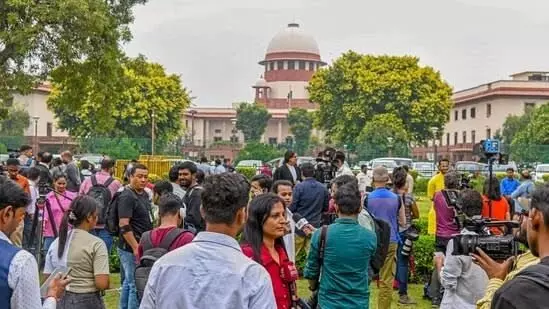'5 crore cases’: India's judiciary collapsing under weight of huge backlog
Till November 2024, district and subordinate courts recorded over 4.53 crore pending cases, according to data released by Indian government
By B.V.Seshagiri Advocate
Representation Image
Hyderabad: India's judiciary, supposed to be a cornerstone of democracy, is now collapsing under the weight of over 5 crore pending cases. This staggering backlog is not just a statistical concern; it is a symptom of systemic inefficiencies and a profound crisis of public trust in the justice delivery system. Immediate reforms are critical to addressing this pressing issue. The recent figures of pending cases, released by government of India are a cause of worry and there is a need to look at solutions which will help curb the crisis.
The Scale of the Crisis:
As of November 2024, India’s district and subordinate courts alone are burdened with over 4.53 crore pending cases. Criminal cases account for 3.43 crore of these, while 1.10 crore are civil cases. The high courts are struggling with over 58 lakh cases, and the Supreme Court backlog has risen by 35% in five years, now exceeding 80,000 cases.
What is particularly alarming is the duration of delays. Over 48 lakh cases have been pending for more than a decade, with some high court cases unresolved for over 20 years. Such delays strip citizens of their fundamental right to timely justice, transforming the judiciary from a beacon of hope into a symbol of frustration.
Root Causes:
Union Law Minister Arjun Ram Meghwal pinpointed a critical issue in the Rajya Sabha there is a chronic shortage of judicial officers. There are 5,245 vacancies in district and subordinate courts, and India’s judge-to-population ratio remains among the lowest in the world. Other key issues include cumbersome legal procedures, frequent adjournments, and inadequate coordination among law enforcement, prosecution, and judicial systems. These bottlenecks exacerbate delays and increase the burden on an already overwhelmed judiciary.
Far-Reaching Impacts:
The backlog extends beyond traditional courts. Adjudicatory bodies like the Information Commissions and the National Green Tribunal (NGT) are similarly affected. The NGT, responsible for resolving critical environmental disputes, managed to dispose of only 278 cases in the past year, leaving over 3,900 still pending. Consumer courts face a backlog of 6.8 lakh cases, leaving citizens waiting for years for compensation for defective goods or services.
This inefficiency fuels disillusionment among citizens and emboldens wrongdoers. The inability to resolve cases involving police brutality, human rights violations, and environmental degradation undermines accountability. Meanwhile, alternative platforms like Lok Adalats are increasingly sought for partial settlements, reflecting a growing lack of faith in the formal judicial system.
A Possible Solution:
The National Judicial Grid:
One of the most promising solutions is the National Judicial Grid (NJG), a digital platform designed to enhance transparency and efficiency. The NJG provides real-time data on pending and resolved cases across all courts, allowing for better resource allocation, performance monitoring, and accountability.
Through advanced analytics and artificial intelligence, the NJG can identify systemic bottlenecks, predict case delays, and suggest solutions for simpler disputes through automation or alternative dispute resolution mechanisms. It also facilitates balanced workload distribution by identifying overburdened courts and redistributing resources accordingly.
Global Lessons on Judicial Reforms India Can Emulate: India can draw inspiration from international examples of successful judicial reforms to tackle its backlog crisis. For instance, Singapore’s judiciary is renowned for its efficiency, achieved through a combination of technology, streamlined procedures, and stringent case management systems. Courts in Singapore employ advanced AI tools for sorting and prioritizing cases, enabling swift allocation of resources and prioritization of urgent matters. Similarly, Brazil’s adoption of digital platforms for e-filing and virtual hearings has significantly expedited case resolutions in its overburdened judiciary. These global experiences highlight that integrating technology, simplifying processes, and investing in robust judicial infrastructure are not just desirable but essential to address systemic inefficiencies effectively. By adapting such proven practices to its unique context, India could make significant strides toward reducing its judicial backlog and restoring public trust in the system.
Reform Priorities:
While the judiciary is overburdened and operating beyond full capacity, it cannot cope with the overwhelming volume of cases without systemic reforms. These include:
1. Increasing Judicial Strength: Urgently filling vacancies and increasing the number of judges at all levels to improve the judge-to-population ratio.
2. Infrastructure Modernization: Doubling investment in court infrastructure, expanding facilities, and enhancing administrative support.
3. Technological Integration: Implementing advanced case management systems, virtual hearings, and AI-driven analytics to streamline operations.
4. Process Simplification: Reducing procedural delays through stricter limits on adjournments and simpler legal protocols.
5. Improved Coordination: Strengthening collaboration among law enforcement, prosecution, forensic labs, and other stakeholders in the judicial system.
Conclusion:
India’s judicial backlog represents not just an administrative crisis but a social and moral failure. The system’s inefficiencies deny justice to millions, erode public trust, and weaken democracy. Initiatives like the National Judicial Grid are promising steps, but they must be supported by broader reforms, including increasing judicial capacity, modernizing infrastructure, and streamlining processes.
The cost of inaction is immense. Justice delayed is justice denied, and the continued inefficiency of the judicial system threatens to render justice inaccessible for generations. India’s democracy depends on a strong, efficient judiciary. Reform cannot wait; the time for decisive action is now.